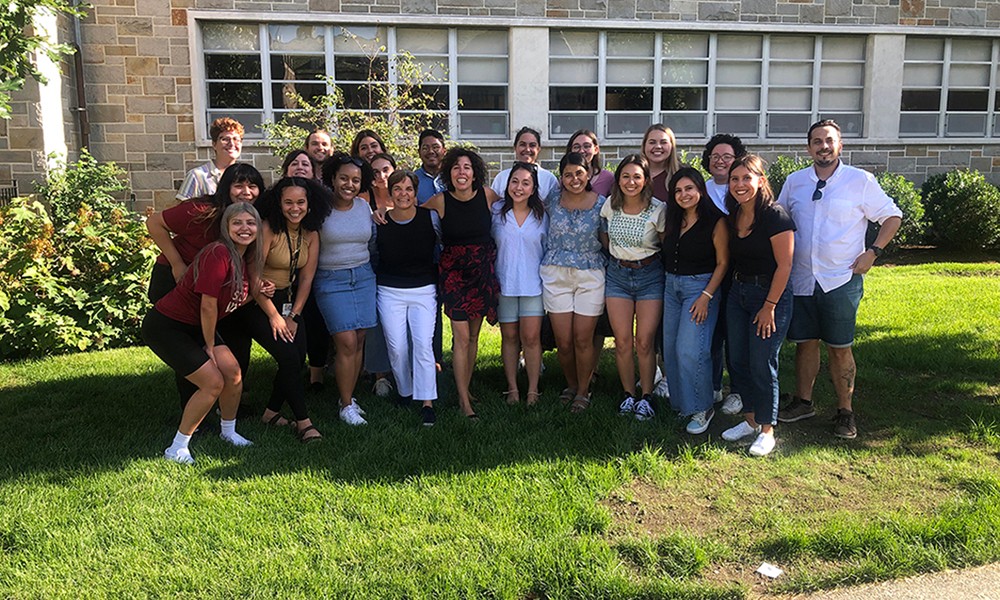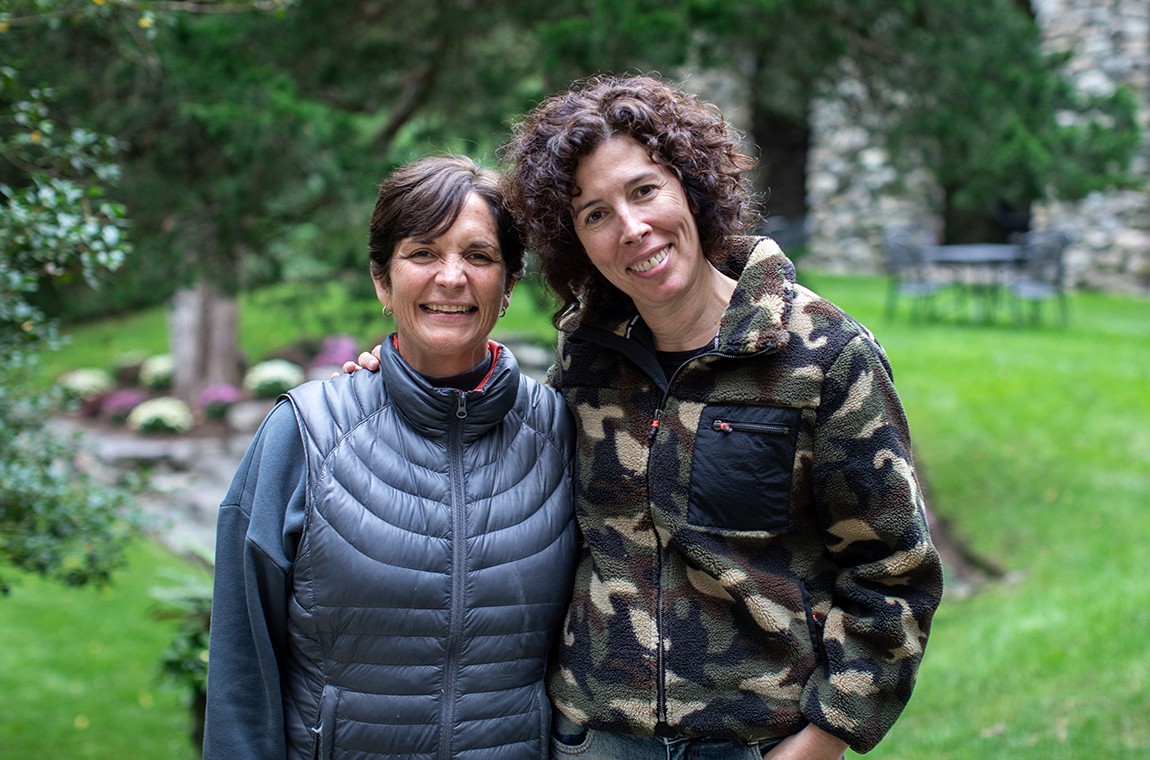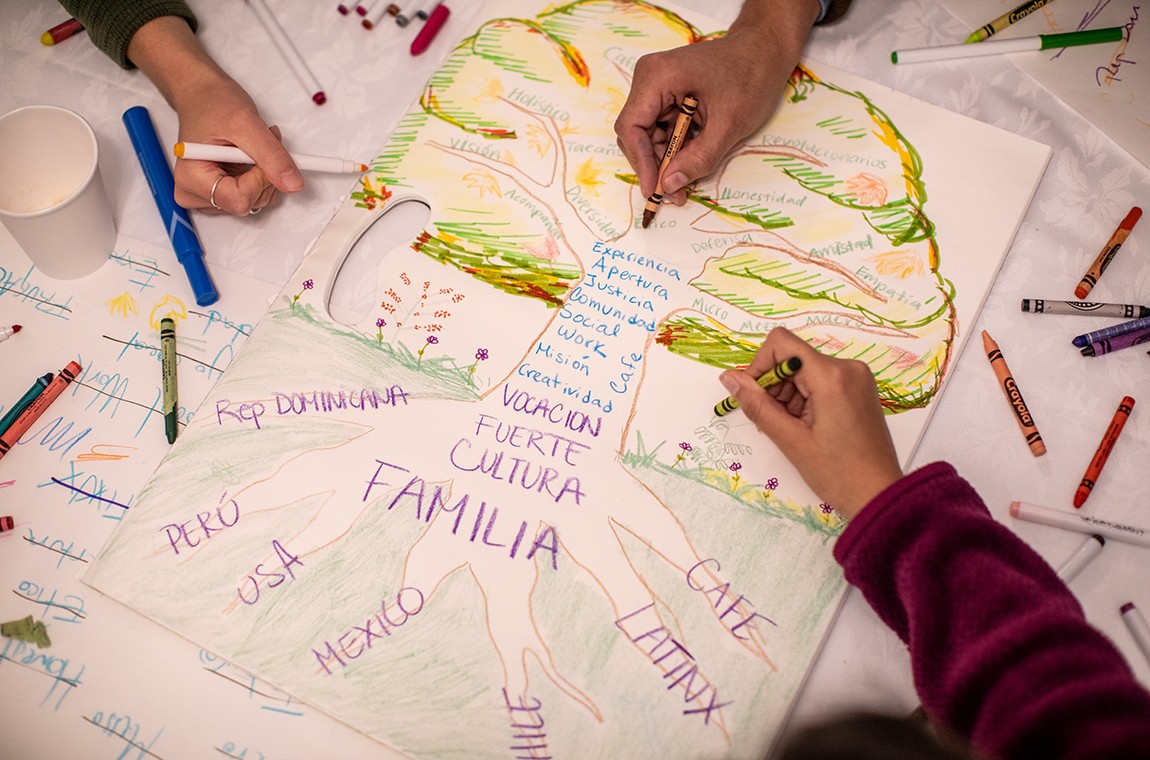
The new cohort of students in the LLI hail from eight states and two countries. Courtesy photo.
The Latinx Leadership Initiative exemplifies the ethos of the Boston College School of Social Work: The best way to create sustainable solutions to complex problems is to work with the people who live with those problems every day.
Since its founding in 2013, the LLI has prepared more than 200 bilingual and bicultural social workers to work effectively with Latinx communities across the country. Students in the program take courses in Spanish, complete internships in schools, hospitals, and prisons, and conduct cutting-edge research that shapes social workers’ strategies to support Latinx clients.
We asked Rocío Calvo, associate professor and founding director of the LLI, and Ximena Soto, assistant director of the LLI, to discuss the biggest challenges facing Latinx communities, how BCSSW is preparing students to collaborate with communities to solve these issues, and what the program is doing to ensure that Latinx students excel in higher education.
The LLI is a cohort-based program that helps students develop a nuanced understanding of the challenges facing Latinx communities in Boston and beyond. What are some of the biggest social issues facing Latinx communities today and how does this initiative prepare students to address them?
Latinx communities are extremely diverse and unique, and the social issues we face are equally diverse. If we were to focus on one major issue we are trying to address through this training program, it is the lack of access to culturally and linguistically aligned services in all systems of care: education, medical, legal, housing, and social. It is a fact that Latinx communities face systemic barriers to accessing services. LLI students are trained to think critically about these complex issues impacting Latinx communities across the country and to collaborate with the people most affected by these issues to come up with effective solutions both from the clinical and macro perspectives.
In preparing future professional social workers to effectively work with Latinx communities, we focus on recognizing community and individual strengths. For instance, we know that Latinx communities in the U.S. have succeeded and thrived for centuries despite widespread anti-immigrant sentiments, discrimination, and systemic obstacles to access means of advancement such as employment, healthcare, and education. In the LLI, we train social workers to have a nuanced understanding of these strengths. In recognizing the already existing assets, our graduates join communities in their own journeys toward well-being.
The LLI focuses on four core elements:
The classroom experience: In the LLI, we teach in Spanish. By teaching in Spanish, we open the door to changing the learning space in which students interact. For students, many for the first time, this change enables them to bring their authentic selves into academic spaces that have historically denied the full expression of their lived experiences. Secondly, we accompany each student on their journey to develop their professional identity and voice. It is important to not only recognize students’ lived experiences but to also build their confidence and skills so that they become professionals with a full cadre of skills based on best practices to work with diverse Latinx populations.
The cohort model: This is a way to navigate academia together. With the cohort model, students support and guide each other, draw from their communal knowledge, and establish strong relationships that accompany them through their professional careers. In school, they work, study, and accompany each other as they meet academic and personal challenges. They become each other’s family, in a way, which is another cultural marker that has strengthened Latinx communities for centuries.
Mentorship: We are embedded in the work of practitioners who have worked with Latinx communities for years. Most of our faculty identify as Latinx and have extensive work and research experience. Our advising body also identifies as Latinx social workers who have practiced social work in greater Boston and beyond. Finally, our supervising social workers also serve as guides for students as they learn how to do the work on the ground. They understand the intricacies of providing services in two languages, with populations that are often not insured or underinsured, and who may be navigating complex situations that our systems may not be prepared to address.
Research: Communities are the experts on the main problems they face. We put at the service of the community our skill set and resources to collaborate in finding sustainable solutions to their most pressing social problems. This is another key component of our model, as many of our students are involved in these community processes and collaborate in a variety of research projects.

Ximena Soto, left, and Rocío Calvo. Photo by Erik Jacobs.
BCSSW students can earn a certificate in Latinx Leadership by taking three specific courses—“Re-thinking Diversity,” “Advanced Clinical Practice with Latinx Populations,” and “Service to Migrants: A Border Perspective.” What are the key things that students who take these courses will learn about working with Latinx communities?
Re-thinking Diversity encourages students to self-examine their own perspectives of the world. Whether they identify as Latinx or not, each student has to examine what their role is in the work they are doing in the community. They have the mandate to understand the impact of the U.S. systems of care and the interaction these have with different communities. Students also have the challenge to understand how their own biases may have been shaped by those systems and how they might play out in the work they do with communities.
Advanced Clinical Practice with Latinx Populations teaches students about the most recurring issues in working with Latinx populations in the U.S., including the biopsychosocial dimensions of different Latinx populations, such as their multilingual, multicultural, and multiracial intersectional experiences.
Service to Migrants: A Border Perspective exposes students to a very important aspect of the Latinx experience in the U.S.: migration and immigration. This travel course helps students to understand how different immigration processes impact the families with whom they will be working. Students gain awareness and understanding of the complex factors affecting Latinx immigrants and their families.
All of these courses help students to understand the diversity of experiences and approaches that they should consider when assessing and working with Latinx populations.

Students in the LLI participated in a range of community-building activities at a retreat in October. Photo by Erik Jacobs.
Students who choose the Latinx Communities field of practice take core classes in Spanish. Why was it so important to tailor the program to focus on the strengths of Latinx students?
The main purpose of teaching in Spanish is to create a space where students do not have to leave any part of themselves at the door. Our model celebrates individuals in their most genuine form, which includes language and culture. Building classrooms that invite students to share their genuine experiences, intersectionalities, and knowledge signals respeto, which is conducive to genuine learning.
Besides transforming the learning space into one in which students’ heritage, culture, and experiences become the norm, teaching in Spanish also allows for more nuanced explorations, discussions, and thinking on how to work effectively with Latinx populations. Students are open to sharing their perspectives and experiences because they are validated and celebrated in the academic space, which is something that many have not experienced before. We create a space in which students’ assets shine: Their resilience and innovation come through because they are allowed to explore how to work with Latinx populations from their own standards rather than from a normative standard that doesn’t recognize the strengths of the community. Our students graduate with a deep understanding of the complex work they will encounter, but also with a rich sense of the importance of our mandate: to base our work on the strengths of the communities with whom we work. It is the only way to collaborate on sustainable solutions to their complex problems.
During the first 10 years of the program, students in the LLI have worked in the field with the school’s many partners in the Greater Boston area that serve the legal, medical, behavioral health, immigration, and educational needs of the Latinx community. Where are graduates working now?
LLI alumni are everywhere! Our graduates’ work ranges from early intervention through the end of life. We have graduates working in community health centers, detention units, protective services, schools, hospitals, universities, immigration clinics, and hospice and community-based settings. While starting in direct service roles, many of our graduates have transitioned into leadership roles from which they are transforming the way we work with Latinx communities across the country.
Leadership in the LLI is intentional and something that is expected from our graduates. The breadth of career options for our graduates is tremendous. They can work with every sector of our profession that serves Latinx populations. Our goal for these alumni is for them to continue the work they have been doing since they graduated from the program: trailblazing in their respective fields, mentoring and supervising those who come after them, and transforming the systems that exclude Latinx communities from accessing the opportunities for advancement they deserve.

